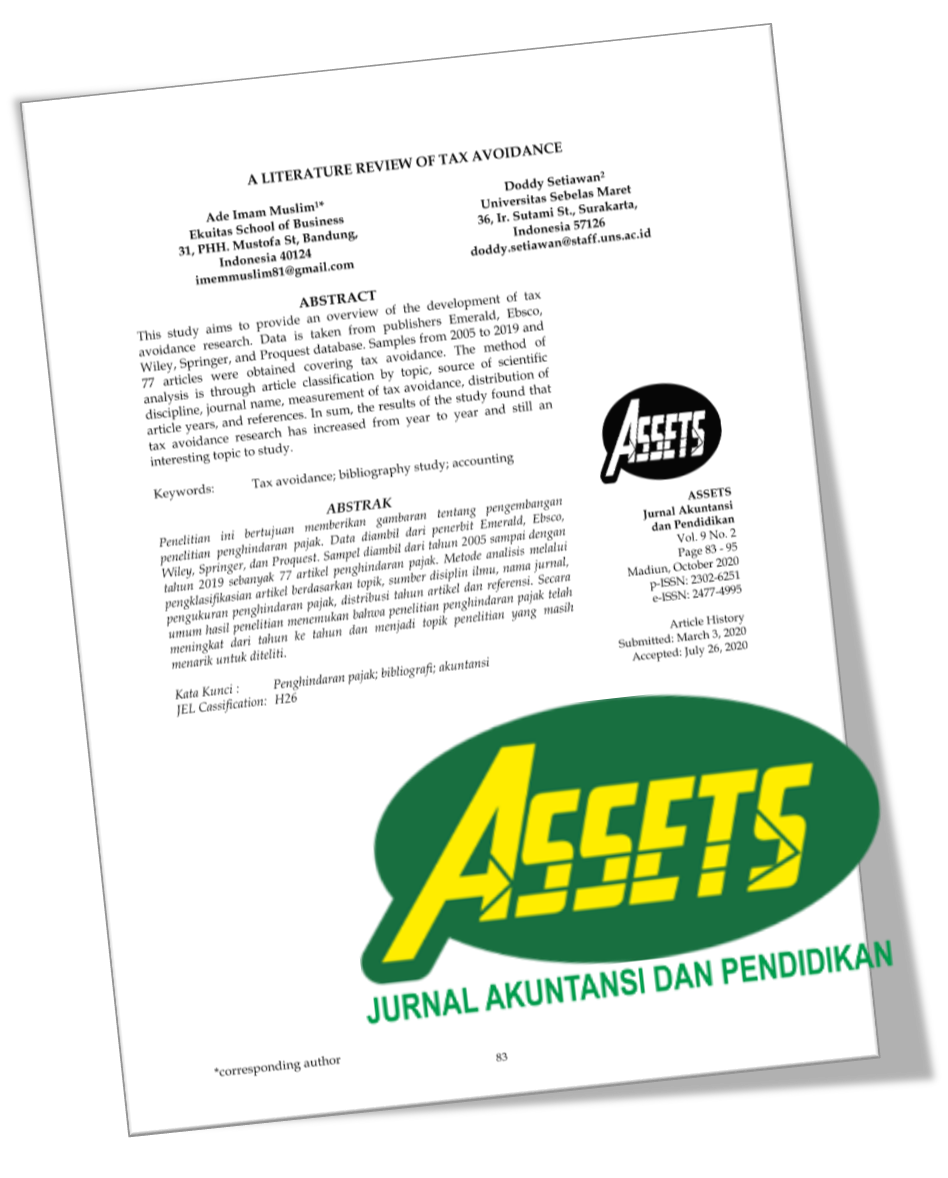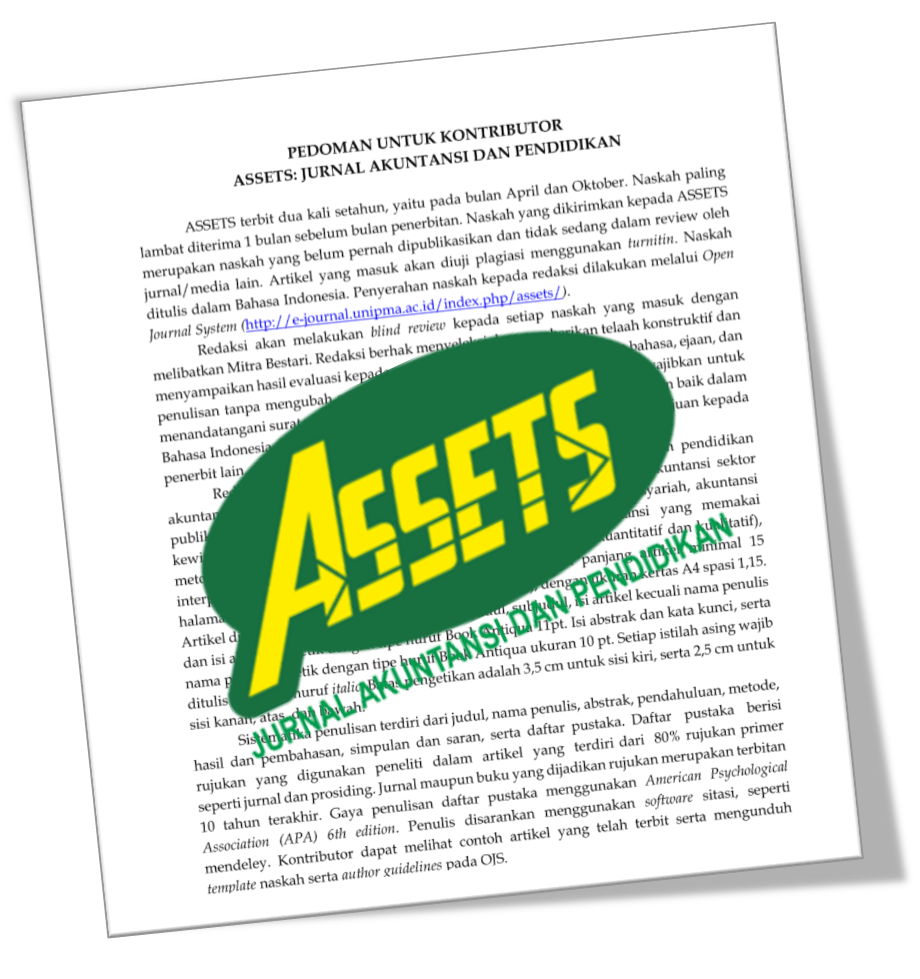INSTAGRAM AND ITS ROLE AS A SOCIAL ENTERPRISE TRANSPARENCY MEDIA IN INDONESIA
Abstract
ABSTRACT
This study identifies the role of Instagram as a medium of transparency for three Social Enterprises that operate in the creative sector with empowering women as part of their social mission. This study employs content analysis with the help of NVivo software on various narratives, photos, and videos uploaded through the Instagram account from January to May 2023. The researcher also interviewed the CEO and beneficiaries via Instagram live chat. This study indicates the significant role of Instagram in building trust and media dialogue between companies and the public, which are essential in achieving company accountability, legitimacy, and sustainability.
ABSTRAK
Studi ini mengidentifikasi peran Instagram sebagai media transparansi bagi tiga Usaha Sosial yang bergerak di sektor kreatif dengan pemberdayaan perempuan sebagai bagian dari misi sosial mereka. Penelitian ini menggunakan analisis konten dengan bantuan software NVivo pada berbagai narasi, foto, dan video yang diunggah melalui akun Instagram pada bulan Januari hingga Mei 2023. Peneliti juga mewawancarai CEO dan penerima manfaat melalui live chat Instagram. Studi ini menunjukkan peran penting Instagram dalam membangun kepercayaan dan dialog media antara perusahaan dan publik, yang penting dalam mencapai akuntabilitas, legitimasi, dan keberlanjutan perusahaan.
Keywords
Full Text:
PDFReferences
Ab Samad, N. H., Arshad, R., Asat, S. H., & Kasim, N. (2017). Sustainability and accountability of social enterprise. Management & Accounting Review (MAR), 16(2), 181–202. https://doi.org/10.24191/mar.v16i2.562
Adam, S., Avilés, G., Ferrari, D., Amstutz, J., Crivelli, L., Enrico, C., Gafner, A., Greppi, S., Schmitz, D., Wüthrich, B., & Zoebeli, D. (2016). Work Integration Social Enterprises in Switzerland. Nonprofit Policy Forum, 7(4), 509–539. https://doi.org/10.1515/npf-2016-0014
Agrawal, A., Gandhi, P., & Khare, P. (2021). Women empowerment through entrepreneurship: a case study of social entrepreneurial intervention in rural India. International Journal of Organizational Analysis. https://doi.org/10.1108/IJOA-03-2021-2659
Agrawal, A., & Jespersen, K. (2023). How do impact investors evaluate an investee social enterprise? A framework of impact investing process. Journal of Entrepreneurship in Emerging Economies, ahead-of-print(ahead-of-print). https://doi.org/10.1108/JEEE-04-2022-0129
Aldina, F., Setiawati, L., & Kania, R. (2021). Loyalitas Konsumen Produk Usaha Sosial: Sebuah Strategi Untuk Membangun Loyalitas Konsumen. Prosiding Industrial Research Workshop and National Seminar, 12, 1061–1067.
Alter, K. (2006). Social enterprise models and their mission and money relationships. Social Entrepreneurship: New Models of Sustainable Social Change, 205–232.
Alter, K. (2007). Social enterprise typology. Virtue Ventures LLC, 12(1), 1–124.
Amelia, S. R., & Dewi, M. K. (2021). How a nonprofit organization delivers online accountability through social media. International Review on Public and Nonprofit Marketing, 18(3), 317–334.
Arnaboldi, M., Busco, C., & Cuganesan, S. (2017). Accounting, accountability, social media, and big data: revolution or hype? Accounting, Auditing & Accountability Journal, 30(4), 762–776.
Bradford, A., Luke, B., & Furneaux, C. (2018). Social enterprise accountability: directions, dominance, and developments. Social Enterprise Journal, 14(2), 156–179. https://doi.org/10.1108/SEJ-03-2017-0018
Bradford, A., Luke, B., & Furneaux, C. (2020). Exploring Accountability in Social Enterprise: Priorities, Practicalities, and Legitimacy. VOLUNTAS: International Journal of Voluntary and Nonprofit Organizations, 31(3), 614–626. https://doi.org/10.1007/s11266-020-00215-8
Burga, R., & Rezania, D. (2015). A scoping review of accountability in social entrepreneurship. Sage Open, 5(4). https://doi.org/10.1177/2158244015614606
Candler, G., & Dumont, G. (2010). A non‐profit accountability framework. Canadian Public Administration, 53, 259–279. https://doi.org/10.1111/j.1754-7121.2010.00126.x
Chandra, Y., & Liang, S. (2017). Social enterprise as a mechanism of youth empowerment. The Hong Kong Journal of Social Work, 51(01n02), 115–144. https://doi.org/10.1142/S0219246217000080
Chu, V., & Luke, B. (2023). NPO web-based accountability: How can we know if NPOs are doing good things? Nonprofit and Voluntary Sector Quarterly, 52(1), 75–105. https://doi.org/10.1177/08997640211062856
Claeyé, F. (2017). A typology of social entrepreneurship models in South Africa. In Social Enterprise Journal (Vol. 13, Issue 4). Emerald. https://doi.org/10.1108/sej-09-2017-0041
Connolly, C., & Kelly, M. (2011). Understanding accountability in social enterprise organizations: a framework. Social Enterprise Journal, 7(3), 224–237. https://doi.org/10.1108/17508611111182386
Cooney, K. (2011). An Exploratory Study of Social Purpose Business Models in the United States. Nonprofit and Voluntary Sector Quarterly, 40(1), 185–196. https://doi.org/10.1177/0899764009351591
Dart, R. (2004). The legitimacy of social enterprise. Nonprofit Management and Leadership, 14(4), 411–424.
Dees, J. G. (2003). Social entrepreneurship is about innovation and impact, not income. Social Edge, 1–4.
Defourny, J., & Nyssens, M. (2006). Defining social enterprise. Social Enterprise: At the Crossroads of Market, Public Policies and Civil Society, 7, 3–27.
DeMers, J. (2020). Why Social Media Keeps Brands Accountable (and 5 Key Lessons for Marketers). https://jaysondemers.medium.com/why-social-media-keeps-brands-accountable-and-5-key-lessons-for-marketers-a1c3d4fef41a
Dewi, M. K. (2017). An in-depth case study of beneficiary accountability practices by an Indonesian NGO.
Dewi, M. K., Manochin, M., & Belal, A. (2019). Marching with the volunteers: Their role and impact on beneficiary accountability in an Indonesian NGO. Accounting, Auditing & Accountability Journal. https://doi.org/10.1108/AAAJ-10-2016-2727
Dhanani, A., & Connolly, C. (2012). Discharging not‐for‐profit accountability: UK charities and public discourse. Accounting, Auditing & Accountability Journal. https://doi.org/10.1108/09513571211263220
Ebrahim, A., Battilana, J., & Mair, J. (2014). The governance of social enterprises: Mission drift and accountability challenges in hybrid organizations. Research in Organizational Behavior, 34, 81–100. https://doi.org/10.1016/j.riob.2014.09.001
Foster, W., & Bradach, J. (2005). Should nonprofits seek profits? Harvard Business Review, 83(2), 92–100, 148.
Guillamón, M.-D., Ríos, A.-M., Gesuele, B., & Metallo, C. (2016). Factors influencing social media use in local governments: The case of Italy and Spain. Government Information Quarterly, 33(3), 460–471.
Haryanti, D. M., Hati, S. R. H., & Anggriyani, D. S. (2020). Profit Untuk Misi Sosial. DBS Foundation.
Haugh, H. (2005). A research agenda for social entrepreneurship. Social Enterprise Journal.
Hendrayani, Y., Hashim, N., Zen, I., & Titisari, P. (2019). Stakeholders Collaborations Process Towards Community Empowerment: The Success Story West Java CSR Forum. IOP Conference Series: Earth and Environmental Science, 298, 12035. https://doi.org/10.1088/1755-1315/298/1/012035
Humphreys, L. (2018). The qualified self: Social media and the accounting of everyday life. MIT Press.
Huybrechts, B., & Nicholls, A. (2013). The role of legitimacy in social enterprise‐corporate collaboration. Social Enterprise Journal.
Karamoy, H. (2017). Accessibility, Accountability, And The Impact Of Social Enterprise. Journal of Life Economics, 4, 1–12. https://doi.org/10.15637/jlecon.204
Kolodinsky, R. W., Ritchie, W. J., & Capar, N. (2022). Social enterprise legitimacy: Application of accountability mechanisms as a multi-institutional context strategy. Journal of Public and Nonprofit Affairs, 8(2), 195–216. https://doi.org/10.20899/jpna.8.2.195-216
Low, C. (2006). A framework for the governance of social enterprise. International Journal of Social Economics, 33(5/6), 376–385. https://doi.org/10.1108/03068290610660652
Mäkelä, H., Gibbon, J., & Costa, E. (2017). Social Enterprise, Accountability, and Social Accounting. Social and Environmental Accountability Journal, 37(1), 1–5. https://doi.org/0969160X.2017.1287583
McAfee, A., Brynjolfsson, E., Davenport, T. H., Patil, D. J., & Barton, D. (2012). Big data: the management revolution. Harvard Business Review, 90(10), 60–68.
Nadzri, F. A. A., Lokman, N., Yusuf, S. N. S., & Naharuddin, S. (2021). Accountability and transparency of accredited social enterprises in Malaysia: website disclosure analysis. Management and Accounting Review (MAR), 20(3), 246–276.
Nair, R., Arshad, R., Muda, R., & Joharry, S. A. (2022). Web-disclosure practices for transparency and the sustainability of non-profit organizations. International Review on Public and Nonprofit Marketing, 1–23. https://doi.org/10.1007/s12208-021-00330-2
Nelson, J., & Zadek, S. (2000). Partnership alchemy: New social partnerships in Europe. Copenhagen Centre/BLF.
Nyssens, M. (2006). Social enterprise. Routledge London.
Ravi, N., Subramoniam, S., VR, H., & Chinta, R. (2022). Consumer purchase intention of social enterprise products: Mediating role of emotional value. Social Enterprise Journal, 18(4), 691–710.
Richardson, M., Tsui, J., Nazir, A., & Ahmed, V. (2017). Activist to entrepreneur: The role of social enterprise in supporting women’s empowerment in Pakistan.
Roberts, J. (1991). The possibilities of accountability. Accounting, Organizations and Society, 16(4), 355–368.
Rotheroe, N., & Richards, A. (2007). Social return on investment and social enterprise: transparent accountability for sustainable development. Social Enterprise Journal.
Sadya, S. (2023). Pengguna Instagram RI Terbesar Keempat di Dunia pada Awal 2023. https://dataindonesia.id/digital/detail/pengguna-instagram-ri-terbesar-keempat-di-dunia-pada-awal-2023
Sanzo-Pérez, M. J., Rey-García, M., & Álvarez-González, L. I. (2022). Downward accountability to beneficiaries in social enterprises: Do partnerships with nonprofits boost it without undermining accountability to other stakeholders? Review of Managerial Science, 16(5), 1533–1560. https://doi.org/10.1007/s11846-021-00485-6
Sarman, S. R., Zainon, S., Atan, R., Bakar, Z. A., Yoke, S. K., Ahmad, S. A., & Shaari, N. H. M. (2015). The web-based accountability practices in social enterprises: Validating the stakeholder theory. Procedia Economics and Finance, 31, 243–250. https://doi.org/10.1016/S2212-5671(15)01226-5
Sean, L. J. (2017). Collaborations, board independence, and website social impact disclosures: A study of social enterprises.
Sekaran, U., & Bougie, R. (2016). Research methods for business: A skill building approach. john wiley & sons.
Selsky, J. W., & Parker, B. (2005). Cross-sector partnerships to address social issues: Challenges to theory and practice. Journal of Management, 31(6), 849–873. https://doi.org/10.1177/0149206305279601
Suchman, M. (1995). Managing Legitimacy: Strategic and Institutional Approaches. Academy of Management Review, 20, 571–611. The Academy of Management Review, 20, 571. https://doi.org/10.2307/258788
Wang, W. J. (2009). Accountability in social enterprises: an analytical framework. The University of Pittsburgh’s Johnson Institute for Responsible Leadership Working Papers.
Article Metrics
Abstract has been read : 148 timesPDF file viewed/downloaded: 0 times
DOI: http://doi.org/10.25273/jap.v12i2.17511
Refbacks
- There are currently no refbacks.
Copyright (c) 2023 Anita Wijayanti, I Made Narsa, Hamidah

This work is licensed under a Creative Commons Attribution-ShareAlike 4.0 International License.
ASSETS: Jurnal Akuntansi dan Pendidikan is supported by
ASSETS: Jurnal Akuntansi dan Pendidikan is indexed by
| | | ||||
| | | | |

ASSETS: Jurnal Akuntansi dan Pendidikan is licensed under a Creative Commons Attribution-ShareAlike 4.0 International License.











